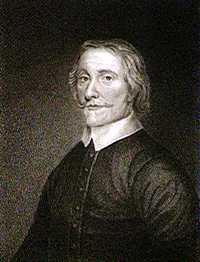
Viscount Valentia is a title in the Peerage of Ireland. It has been created twice. The first creation came in 1621 for Henry Power. A year later, his kinsman Sir Francis Annesley, 1st Baronet, was given a "reversionary grant" of the viscountcy, which stated that on Power's death Annesley would be created Viscount Valentia. Annesley, a member of an influential Anglo-Irish family which descended from Newport Pagnell in the County of Buckinghamshire, was a favourite of James I, who granted him land in Ireland, notably the fort of Mountnorris in County Armagh. He was knighted in 1616, created a baronet, of Newport Pagnell in the County of Buckingham, in the Baronetage of Ireland in 1620 and Baron Mountnorris, of Mountnorris in the County of Armagh, in 1628.

Sir Oliver St John was an English judge and politician who sat in the House of Commons from 1640-53. He supported the Parliamentary cause in the English Civil War.

Lieutenant Colonel James Neville Marshall VC, MC & Bar, was an English recipient of the Victoria Cross, the highest and most prestigious award for gallantry in the face of the enemy that can be awarded to British and Commonwealth forces.

Altham is a village and civil parish in the Borough of Hyndburn, in Lancashire, England. The village is 4 miles (6.4 km) west of Burnley, 3 miles (4.8 km) north of Accrington, and 2 miles (3.2 km) north-east of Clayton-le-Moors, and is on the A678 Blackburn to Burnley road.

Admiral Sir William Wynter held the office of Surveyor and Rigger of the Navy for 40 years, from 1549 until his death in 1589, and combined that with the office of Master of Navy Ordnance from 1557. He was an admiral and principal officer of the Council of the Marine under Queen Elizabeth I of England and served the crown during the Anglo-Spanish War (1585–1604). He was returned four times to parliament in Elizabeth's time.

Lydia Ernestine Becker was a leader in the early British suffrage movement, as well as an amateur scientist with interests in biology and astronomy. She established Manchester as a centre for the suffrage movement and with Richard Pankhurst she arranged for the first woman to vote in a British election and a court case was unsuccessfully brought to exploit the precedent. Becker is also remembered for founding and publishing the Women's Suffrage Journal between 1870 and 1890.

Thomas Matthew Burns KC*HS is a British Roman Catholic bishop. On 16 October 2008, he was appointed as Bishop of Menevia by Pope Benedict XVI, becoming so on 1 December 2008 when he took possession of his new see, on which day he ceased to be Bishop of the Forces. He is now bishop promoter for the Apostleship of the Sea, A Catholic organisation that provides pastoral and practical assistance to all seafarers. It was announced in July 2019 that Burns had retired from the role of Bishop of Menevia after 11 years.
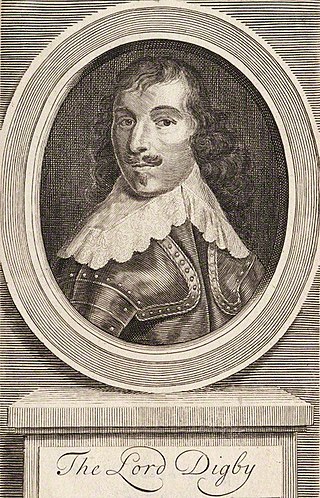
Robert Digby, 1st Baron Digby, was an Anglo-Irish peer.
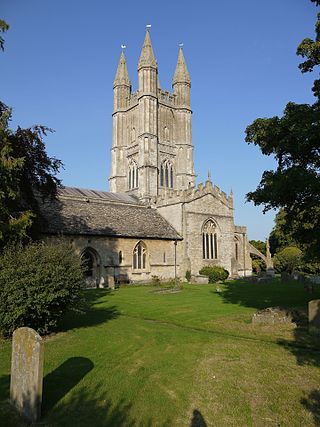
St Sampson's is the Church of England parish church of the town of Cricklade, Wiltshire, England. A large aisled church with a central tower, the present building dates from the late 12th century but has fragments of Anglo-Saxon work. The church is a Grade I listed building.
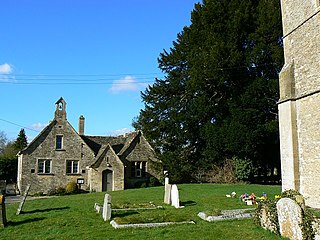
Latton is a village and civil parish in Wiltshire, England, 1.5 miles (2.4 km) north of Cricklade, on the county border with Gloucestershire. The village is bypassed by the A419 road from Swindon to Cirencester. The parish includes the hamlet of Eysey, formerly a village with its own church and parish.
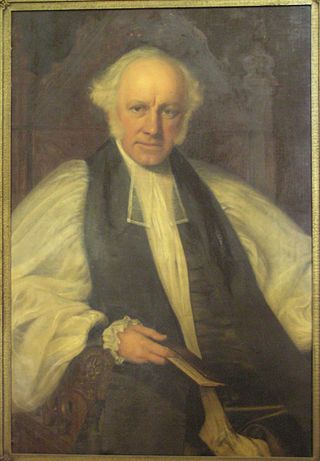
Joseph Cotton Wigram was a British churchman, Archdeacon of Winchester and bishop of Rochester.
Sir William Masham, 1st Baronet was an English politician who sat in the House of Commons variously between 1624 and 1655.
Sir John Tufton, 2nd Baronet was an English politician who sat in the House of Commons from 1660 to 1685.
Sir James Altham, of Oxhey, Hertfordshire, was an English judge, briefly a member of the Parliament of England, and a Baron of the Exchequer. A friend of Lord Chancellor Francis Bacon, Altham opposed Edward Coke but advanced the laws of equity behind the fastness of the Exchequer courts, so long considered almost inferior. Through advanced Jacobean royalism he helped to prosecute the King's enemies and centralise royal power of taxation. With Sir Edward Bromley, he presided at the Lancashire witch trials in 1612.

St James' Church is in the village of Altham, Lancashire, England. It is an active Anglican parish church in the deanery of Accrington, the archdeaconry of Blackburn, and the diocese of Blackburn. Its benefice has been united with that of All Saints, Clayton-le-Moors. The church is recorded in the National Heritage List for England as a designated Grade II* listed building.
Francis St John was an English lawyer and politician who sat in the House of Commons at various times between 1654 and 1698.

St Mary the Virgin Church is located in Latton, Harlow, Essex, England. It is an Anglican church and is liberal catholic in tradition. The church building is Grade I listed.
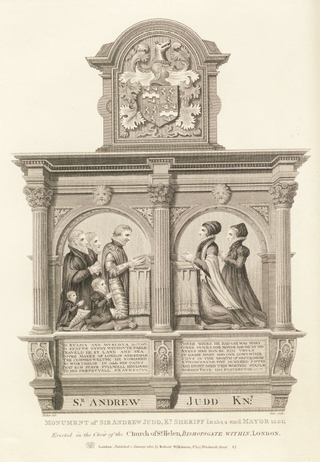
Sir Andrew Judde or Judd was a 16th-century English merchant and Lord Mayor of London. He was knighted on 15 February 1551.
Lieutenant-General Sir Edward Altham Altham, was a British Army officer who served in the Second Boer War and as a senior intelligence officer during World War I. He was Quartermaster-General in India 1917–1919.
The Venerable Charles Smith was an English Anglican priest in the 17th century.













